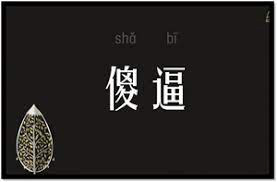Before we can start translating, we need to clarify something:
Some people won’t believe me, but the original phrase is actually 傻屄 (shǎbī), not 傻比 or 傻逼, etc. As chinaSMACK correctly points out in their excellent glossary, it’s often simply written as SB, 傻逼, 傻比, etc, which has led to many Chinese (particularly younger Chinese) not realizing that the original phrase uses the 屄 character.

Here’s the definition from chinaSMACK:
SB = 傻屄
[shǎbī / sha3 bi1]
noun/adjective.
Stupid cunt, or describes something as being very stupid. Often shortened to “SB”, “sha bi”, 傻B, 2B (2 = S), or 傻 + any Chinese character with the “bi” sound like 逼 or 比。 In fact, 屄 is the true character but almost never used.
[1]
—
So, why do people typically not write 傻屄?
Well, as many people have aptly pointed out in the comments below, this could be for several reasons.
When I first wrote this answer I, somewhat ignorantly, opined that this was due to internet censorship and the CCP, and Chinese in general, tending to be pretty conservative. Since that time, others have contested that the term isn’t censored or that the real reasons are more likely to have to do with previously high levels of illiteracy in China (e.g, people might know what a word sounds like when spoken, but not know what characters are used to write it—similar to a person knowing how to say an English word but not knowing how to spell it), or just not seeing it written the original way and assuming it’s written a different way. Others have argued the original character is just too vulgar for decent people to write.
It seems likely it’s a combination of these factors.
Censorship is often not done directly by the government, so individual companies end up coming up with their own rules for censorship, which are not always consistent. Some might censor certain ‘bad’ words, while others might not. There’s also considerable evidence that individuals self-censor in an effort to avoid potentially getting in trouble. I also agree with arguments about the effects of illiteracy or a lack of exposure to the original version.
—
In my experience, many Chinese (again, particularly younger Chinese) don’t realize how vulgar the original term is (傻 just means ‘stupid’ and it’s a relatively common, inoffensive word, so it’s the second word that adds the vulgarity). They hear it being used casually, so they in turn think of it in a casual way, which is aided by the fact that the actual character in the phrase is rarely written.
So, partly because of the different characters in use, and partly because different social groups use some terms differently from the public at large, this has led to differences in use and in the perceived meaning of the phrase. This is why many Chinese will translate 傻屄 as anything from ‘moron’ or ‘idiot’ to ‘douchebag’ (less accurate, IMO; ‘asshat’ would be closer), ‘stupid’ or, most accurately, ‘stupid cunt.’
When I taught senior middle school for two years, it was pretty common to hear my students say 傻屄 to describe someone or something.
If I ever asked them to say what they meant in English, they would usually reach for words like ‘foolish,’ ‘silly’ or ‘stupid,’ and in the majority of cases when I heard it used, it was in a more or less friendly, teasing way.
Some Chinese friends have told me that they think my students had bad language, since many of them seemed pretty comfortable with lots of Chinese swear words (我操, 我去, 坏蛋, 牛屄, etc.), but I think using that kind of language is pretty common for that age group around the world—everyone is trying to sound more ‘adult’ and often they end up overcompensating.
Most adults over the age of 40 will probably tell you that it’s bad language and you should avoid saying it. Among kids, teenagers and young adults, it’s something you can use with care, if you’re pretty good friends, you know they use it, and you’re using it in a joking, teasing way.
Personally, I don’t use it.
Why?
Well, knowing that ‘cunt’ is the correct literal translation of the second character, I’m just not comfortable with using that word in any language, even if I know many of my Chinese friends use it and wouldn’t mind.
In English, and perhaps particularly American English (for reasons I’m not aware of—maybe someone like Oscar Tay knows?) the c-word is considered very strong, bad, rude, vulgar language.
Most people seem to feel more comfortable swearing in a second language than in their native tongue. Many of my Chinese friends will readily drop f-bombs and others left, right and center, even if they avoid using Chinese swear words. It’s understandable—it’s less familiar, so it feels less sacred and less taboo—but this one still feels like a bridge too far for me to feel comfortable using it.
Thank you all the ai’s were refusing to translate someone really needs to a none soy ai
傻逼在中文中是不带戏虐性的,通常形容一个干了一件蠢到极点且对别人的利益产生了影响的事的人,通常是骂人的
带有戏虐性的词则是 蠢货 可以在人比较傻的或者干了一些很蠢的事(前提是那个人是你好哥们)的情况下使用
(when you are playing bedwars then one of your team member do nothing and just stand here you can call him 蠢货
but if he help other team broke your bed you can call him 傻逼
傻逼
我是傻逼